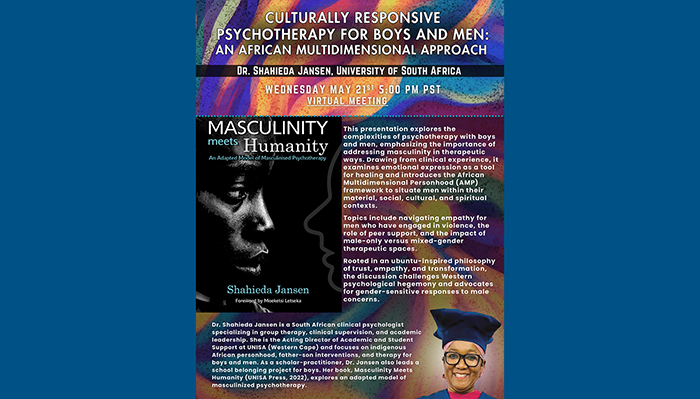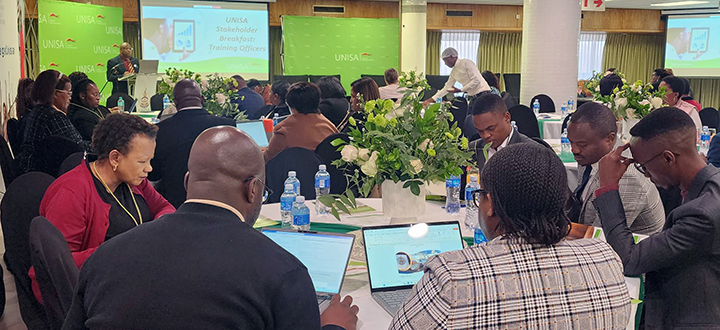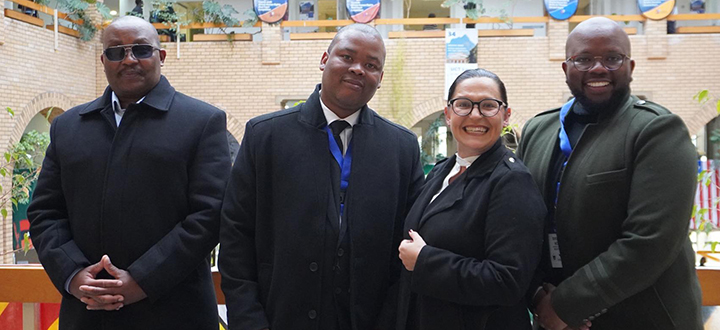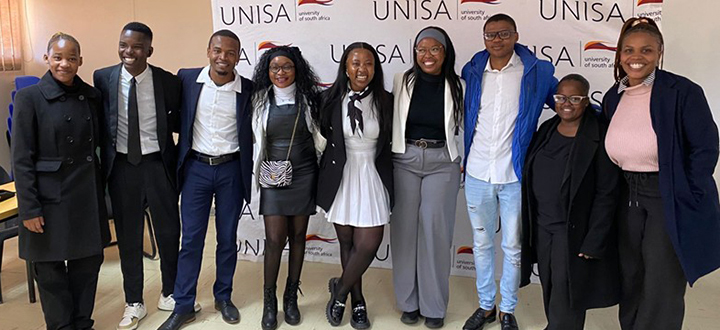News & Media
Unisan shares psychology expertise as visiting scholar in the USA

Dr Shahieda Jansen's first book
The Deputy Director for Academic and Technology Support at Unisa’s Western Cape Region, Dr Shahieda Jansen, was a recent visiting scholar at the Chicago School of Professional Psychology in California. She presented a series of lectures and clinical engagements at that institution’s campuses in San Diego, Anaheim and Los Angeles.
Jansen obtained her PhD in Clinical Psychology from Unisa. Her research interests include male-focused psychotherapy with boys and men and models of human nature. She has facilitated men's groups for over a decade and a half. At the end of 2022, Unisa Press published her first book, Masculinity Meets Humanity: An Adapted Model of Masculinised Psychotherapy.
Jansen describes her approach to psychotherapy as Africentric. She situates psychotherapy practice to reflect local populations' assumptions, values and beliefs. The foundation of her therapeutic interventions is built on the concept of the Umoya-self, a theory of sociospiritual human nature. Her unique method of taking advantage of small group dynamics for behaviour change can be seen in action in the School Belonging Project for boys. The project was registered as a community engagement project with Unisa in 2024, in collaboration with the College of Human Sciences. Globally, boys have fallen behind girls in academic performance as early as Grade 1. This gendered discrepancy in academic performance is maintained in higher education, which is reflected in an enrolment rate of almost 70% female and roughly 30% male.
The School Belonging Project's point of departure is the relationship between belonging and performance. The programme serves to make boys feel present, visible and welcomed within the school environment. When boys are emotionally engaged, they can focus academically. Girls' academic performance is enhanced when boys feel welcomed in the school environment.
Jansen's passion for her work and research in this field caught the attention of Prof Hans Reihling, a lecturer in the division of Marriage and Family Therapy at the Chicago School of Professional Psychology. After a few years of correspondence, Reihling invited Jansen to visit their department in the United States of America.
From the Cape Flats to California
Jansen documented her experience and shared insights from her visit on her LinkedIn profile. One excerpt reads as follows:
The greatest lesson of this exchange is that my decades-long epistemic disobedience – my (not so) quiet refusal to defer to Global North knowledge repositories embedded in South African psychology – has borne fruit. The visit was marked by genuine collaboration and shared learning. This is what a scholarly clinical exchange should be: a space for reciprocity, not hierarchy; dialogue, not deference.
Jansen also noted that her "Africentric inclinations" resonated with the students she engaged with at the school, irrespective of their individualistic socialisation. Unpacking the experience further, she notes the following:
These students responded with enthusiasm. Their repressed social natures were reawakened by my interactive, playful style. Group-based activities drew them outside, into embodied presence and into meaningful connection. As they moved, they became visible to each other – and perhaps to themselves – in ways that are too often absent from clinical spaces.
She further opined that "maintaining my Africentric approach during my visit to the Chicago School in California reaffirmed that, as Africans, we must have confidence in our own onto-epistemologies. Our ways of knowing and being are not inferior alternatives – they are deeply grounded, relational, and life-affirming. Not only Africa, but the world stands to benefit from what we carry: a more whole, humane, and compassionate approach to healing."
* By Vicky-Lee Lee Shew, Communication Officer, Western Cape Region
Publish date: 2025-07-22 00:00:00.0


 Power systems fundi to share energy expertise during Unisa's CNA Research Symposium
Power systems fundi to share energy expertise during Unisa's CNA Research Symposium
 College of Accounting Sciences strengthens stakeholder collaboration for student success and academic integrity
College of Accounting Sciences strengthens stakeholder collaboration for student success and academic integrity
 Unisa law students shine at the 34th Christof Heyns African Human Rights Moot Court Competition
Unisa law students shine at the 34th Christof Heyns African Human Rights Moot Court Competition
 Unisa Ekurhuleni celebrates launch of Black Lawyers Association Student Chapter
Unisa Ekurhuleni celebrates launch of Black Lawyers Association Student Chapter
 Unisan shares psychology expertise as visiting scholar in the USA
Unisan shares psychology expertise as visiting scholar in the USA